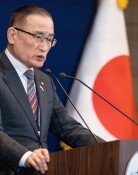Post-Kyoto Era Just 6 Years Away
Post-Kyoto Era Just 6 Years Away
Posted October. 05, 2007 06:37,
Through greenhouse gas reduction projects and investments in carbon funds, SK Energy has made inroads into the emissions trading market. The move is in preparation for the post-Kyoto era starting in 2013, after which Korea is required to cut its emissions.
An SK Energy official said on October 4, We plan to register our reductions facility in Seongam landfill with the UN and to secure emissions rights. We are pressing for the first carbon fund in Korea. In 2006 the company started operating methane capture plant and cut greenhouse gas emissions by 40,000 to 50,000 tons. The company plans to report the emissions cut to the UN and expects to receive a commensurate amount of emissions rights in return.
SK Energy will also carry out a Clean Development Mechanism project, an arrangement under the Kyoto Protocol, allowing industrialized countries with a greenhouse gas reduction commitment (called Annex 1 countries) to invest in projects that reduce emissions in developing countries as an alternative to more expensive emission reductions in their own countries.
The company is also investing in a 200-billion-won carbon fund, which was introduced in Korea this past August. It is said that not only SK Energy but also Posco, Korea Electric Power Corporation, Korea Development Bank, and the Samsung Group are interested in the carbon funds run by Korea Investment & Securities. An SK Energy official said, In an effort to find new sources of revenue and to secure emissions rights, we decided to take part in a carbon fund. The size of our investment will be determined by the end of the month.
Domestic emissions trading market in 2012 will be 448.7 billion won-
Under the 1997 Kyoto Protocol, industrialized countries are required to cut greenhouse gas emissions by certain amounts from next year to 2012. Japan, for example, is required to cut emissions 6% below its 1990 level. Korea, the 10th largest emitter in the world, is regarded as a developing country and currently has no mandatory emissions target. However, business circles say that Korea can be included in countries that are required to cut emissions under a post 2012 climate accord.
Energy-intensive electric power, steel, oil refinery, and petrochemical industries are worried. If we are hit with the reduction levels other industrial countries face, we would have no other choice but to shut down some of our operations. That is why some large companies are quick to secure emissions rights. Even though Korea will not be required to reduce emissions, making profits through emissions trading is an appealing idea.
According to the Ministry of Commerce, Industry, and Energy, domestic emissions trading market in 2007 generated 149.8 billion won, and that will grow to 448.7 billion won in 2012. Companies without emissions reduction facilities such as LG International Corporation and Samsung Corporation are either pushing for or considering CDM projects. Senior researcher Lee Seo-won of the LG Economic Research Institute said, Korea is highly likely to be required to cut emissions after 2012, but preparation for that is rather slow in Korea. The government and industries should come up with an industrial emissions target and plan soon.
parky@donga.com larosa@donga.com






![[단독]김경 “1억원 줄때, 강선우도 함께 있었다” 자수서](https://dimg.donga.com/c/138/175/90/1/wps/NEWS/IMAGE/2026/01/14/133148772.5.jpg)
